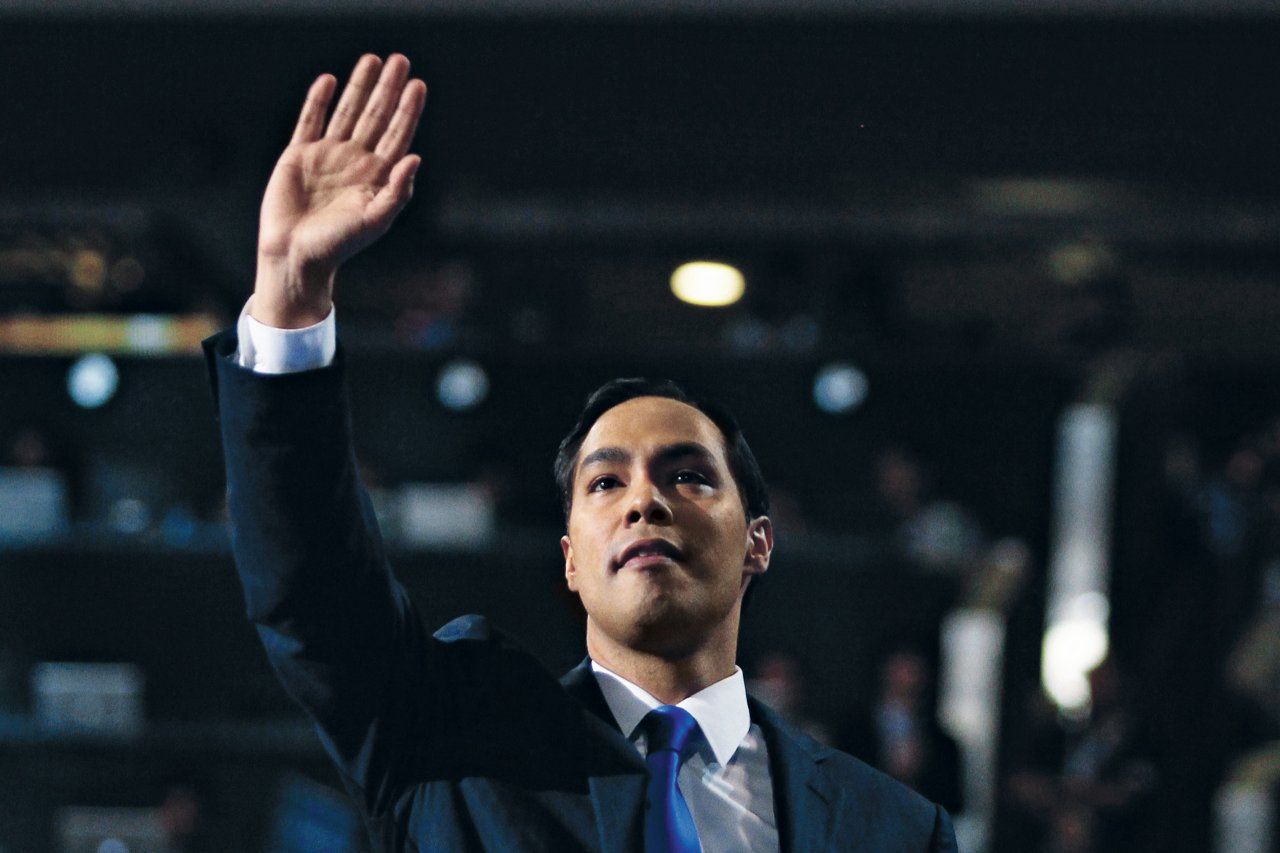
Mayor Julián Castro is on his way to Austin. This wasn't always part of the plan, or so I'm told. Castro was originally scheduled to spend the day in San Antonio, the sprawling South Texas metropolis over which he's presided since 2009, so that he could smile and wave at a press conference for the city's annual spring street fair.
But now he has other business to attend to. Statewide business. National business.
Last week Texas's top three politicians—Republican Gov. Rick Perry, Republican Sen. John Cornyn, and Republican Sen. Ted Cruz—announced they'd be appearing together at the statehouse in Austin to explain (yet again) why accepting tens of millions of federal dollars to expand the state's Medicaid program would be a terrible idea, and Lone Star Democrats were faced (yet again) with their usual problem. Texas hasn't elected a single Democrat to statewide office since 1994; the last of the breed vanished from Austin four years later. The result, as Castro tells me somewhere between San Antonio and the capital, is that "for far too long, there has not been a voice of reason to provide an opposing idea about the direction the state should take on issues like this." And that, apparently, is where Castro comes in.
In case you don't remember, Castro is the guy—slight build, slick black hair, big, bashful grin—Barack Obama handpicked to deliver the keynote address at the 2012 Democratic National Convention in Charlotte, North Carolina, the same venue that had propelled Obama into the political stratosphere eight years earlier. Castro was all over the news last summer. Stanford undergrad. Harvard Law. Elected to the San Antonio City Council at 26. Mayor at 34. "The Post-Hispanic Politician." "The Latino Obama." He came, he spoke—"of a generation born as the Cold War receded, shaped by the tragedy of 9/11, connected by the digital revolution"—and he conquered, becoming, for a few news cycles, at least, the Democratic Party's great brown hope.
It didn't take long for the national buzz to fade. It never does. But Castro didn't disappear. He simply went back to Texas. His sights may not be set on the White House—not yet. But that doesn't mean his sights aren't set on anything else.
And so here he is, reclining in the back a large black American SUV, San Antonio receding in the rearview mirror. Castro's communications director is perched in the passenger seat, tapping on his iPhone; a plainclothes policeman is at the wheel, tearing north on I-35—through Hill Country, toward Austin—at a speed that can't possibly be legal. Castro and his twin brother, newly elected Texas Rep. Joaquín Castro, are racing to the capitol to deliver the Democratic counterpunch. "Joaquín and I both know that if we go to Austin, that's raising the profile of an issue more than if two state representatives or two state senators make the same viewpoint known," Castro tells me. "That's why you're not going to have an unresponded-to barking session by these Republican elected officials anymore. That's gone. It's over."
As we pull into downtown Austin, I ask if Democrats will ever be able to compete in Texas again, and if so, what that will take, other than more press conferences.
"Candidates," Castro says. "Candidates who excite people."
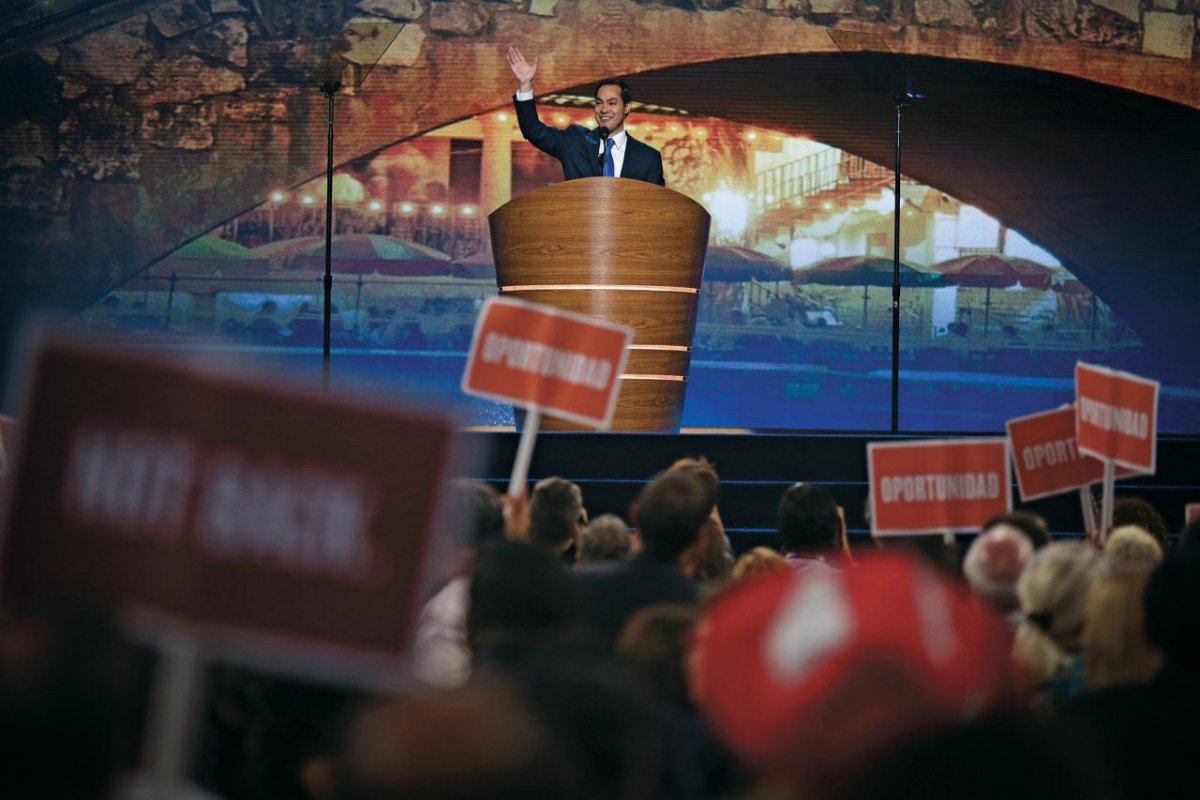
Down in the Lone Star State, the notion that red Texas might someday become blue—or at the very least, purple—is no longer a crazy idea. And almost everyone I encountered cited the same three reasons.
The first is demographics. In Texas, Hispanics, African-Americans, and Asians already outnumber Anglos, yet in the last presidential election, Texas was the only majority-minority state in America that didn't vote for Obama. In part that's because Texas as a whole leans about 10 percent more Republican than Democratic. But the bigger issue is turnout. Even though Hispanics currently make up 38 percent of the population, they cast only 22 percent of the ballots in 2012.
As participation rates go, that's pitiful. But the potential for Democrats, whom Hispanic voters tend to prefer by margins of 2–1 or more, is staggering. Research by Mark Jones, the chairman of the political-science department at Rice University in Houston, shows that if Texas Hispanics had voted in 2008 at the same level as their counterparts in California, John McCain's margin of victory would have been slashed in half, from 12 percentage points to 6. What's more, it's clear that all this pent-up potential will only increase in the years ahead. Between 2000 and 2010, Hispanics accounted for 65 percent of Texas's population growth, a rate that shows no signs of slowing. In fact, by 2030 Hispanics will make up a larger share of the electorate (43 percent) than Anglos (39 percent).
Which brings us to the second reason Lone Star liberals are sounding more hopeful these days: the arrival, in January, of Battleground Texas, an outfit designed to help Democrats capitalize on the state's tantalizing demographic trends. For more than a decade, left-leaning operatives and analysts have talked of tapping into Texas's vast, dormant Hispanic electorate, but no one has had the money, technology, or organizational oomph to actually pull it off.
The people behind Battleground Texas believe they can, and there is reason to believe them: they are, after all, the same people who got Barack Obama elected twice. Jeremy Bird, who's advising the group from Chicago, directed Obama's national field operation in 2012; Jenn Brown, who's running the show in Austin, was in charge of Ohio last November. The rest of the Battleground Texas staff is drawn from other pivotal 2012 locales—Colorado, Virginia, Florida—and top Democratic donor Steve Mostyn has already pledged to round up $10 million in initial funding. The goal, says Bird, is to make Texas a battleground state by treating it like one. "Part of the reason we won Florida by 50,000 votes in 2012 is that we had organizers on the ground for six years who were running a 21st-century grassroots campaign with data, with digital, with smart analytics, with field," he tells Newsweek. "We need that kind of long-term vision in Texas."
Finally, there's Julián Castro himself.
Spend some time with the mayor, and the main thing you notice is that he is openly, guilelessly ambitious. It was Castro, for example, who first brought up his alleged gubernatorial ambitions during our two days together—not me. "I'm not going to run for governor in 2014," Castro confessed, unprompted. And yet that decision, he continued, was not without its downsides. "The bad part is that the state needs to change," he explained. "And 2014 is going to go by, and it may well be that there's no significant candidate on the Democratic side to start changing it." But then Castro was quick to remind me, lest I get the wrong idea, that he wasn't ruling out anything beyond 2014—far from it. "If I do a good job, when my term is up [in 2017], I'll look around and see what's possible," he added. "So yeah, it may be that one day I run for statewide office. People shouldn't be surprised if I do that eventually." When I asked whether he was initially uncomfortable campaigning for public office, Castro hinted at even grander aspirations. "It's not like I was running for president of the United States first," he said. In short: the mayor's current campaign—he's up for reelection in May—probably won't be his last.
So far, much like Obama in the early stages of his own ascent, Castro has attracted a lot of attention and acclaim because of who he is (a handsome, well-educated, charismatic, young politician with a compelling backstory and post-partisan, post-ethnic vibe) and what he represents (America's rapidly diversifying electorate). But to begin to fulfill his promise, all Obama had to do was defeat crazy, conservative Alan Keyes in liberal Illinois. Castro, in contrast, has to accomplish something 102 consecutive Democratic candidates before him have failed to accomplish: win statewide in Texas.
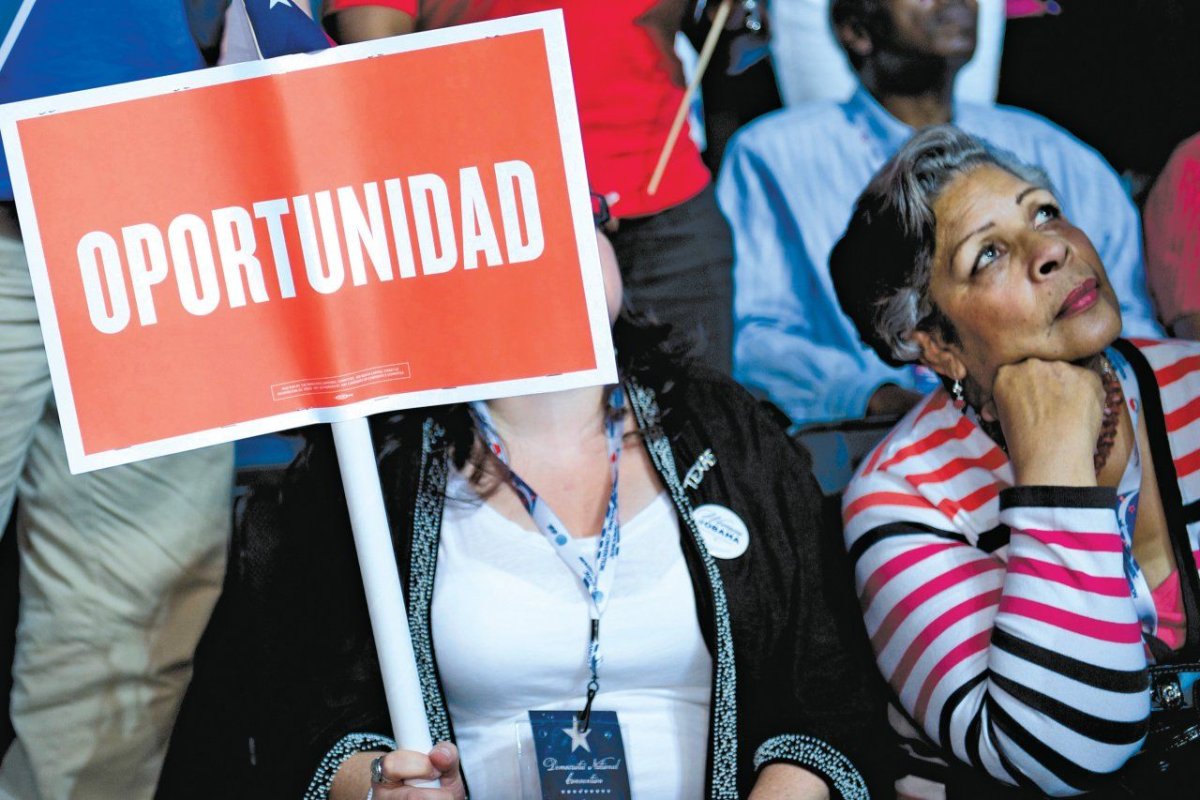
One of Castro's earliest memories is of handing out leaflets for a local school-board candidate in the late 1970s. He was 4 years old. It was a full-immersion childhood: his mother, Rosie Castro, was an activist in the Chicano movement; she met Julián's father, Jesse Guzman, through La Raza Unida (the two never married). Still, Castro never wanted to go into politics himself.
"I didn't like it," he says. "I didn't see it as much fun as a young person, or as something you could make progress with. And I didn't want to be poor, either."
When Castro entered Stanford, his plan was to go into broadcast journalism. (You can still see it, actually: polished and poised, he carries himself like a local news anchor.) But a pre-internship tour of a San Antonio newsroom ended that particular dream—at 19, he was too "idealistic," he says, to hype "fires and crime" for a living—and Castro accepted a summer job in the Clinton White House instead.
That's when Castro realized he couldn't resist the pull of politics. It was 1994, the year of Newt Gingrich's "Contract With America," and before long, Castro was back at Stanford, running for student council alongside Joaquín. (They tied for first.) "At Stanford I saw a community that was much better educated, had a much higher income, and was more innovative," he says. "At the same time, in San Antonio, I saw a city with a much stronger sense of community. I wanted more people from my city to be able to have the kind of opportunity that I had." Castro held his first political fundraiser while still a student at Harvard Law—his classmates ponied up $2,000—and was elected to the San Antonio City Council less than a year after returning home from Cambridge.
Castro's first run for mayor, in 2005, was unsuccessful: after a few amateurish mistakes—a shoddy contributions report, an ethics reprimand, a Parent Trap incident in which Joaquín was accused of standing in for Julián at a local event—he lost by 3,820 ballots. But four years later Castro won without a runoff, and in 2011 he was reelected with 83 percent of the vote. The mayor of San Antonio is not nearly as powerful, by law, as the mayor of, say, New York, but since taking office, Castro has maximized his impact by mastering the bully pulpit and redirecting city resources toward reform. One of his first moves was to clean up the local utility, which he quickly learned had been underreporting the potential cost of an upcoming nuclear project by $2 billion; he sacked the CEO and steered the city toward natural gas instead. In the fall of 2010, after collecting community input for six months, Castro unveiled a sweeping, progressive initiative designed to "transform San Antonio into a world-class city by the year 2020": less driving, more public transportation; less pollution, more green jobs; less sprawl, more growth downtown; and a stronger public education system, above all else.
The rest of Castro's tenure has centered on implementing the "SA2020" vision: a Democratic wish list geared toward helping San Antonio's lower-income (and predominately Hispanic) population prepare for a more urban, techno-savvy future. In 2010 the city launched Cafe College, a one-stop shop for advice on the application and financial-aid process. Developers were soon proposing new residential projects downtown, and city planners were drawing up streetcar blueprints. Last May, at a time of statewide, Tea Party–inspired austerity, Castro persuaded voters to fund SA2020 with a $596 million bond issue—the largest in San Antonio's history. His most impressive feat, however, came the following November, when San Antonio residents agreed to raise their own sales tax by an eighth of a cent to finance PreK 4 SA, a program Castro created in consultation with local business leaders that will train a new class of high-quality public-school teachers and provide early-childhood education to more than 4,000 4-year-olds. (Of the four largest cities in Texas, San Antonio schools currently perform the worst overall, according to the nonprofit Children at Risk.) "After the legislature slashed more than $200 million from full-day prekindergarten in 2011, Castro got San Antonio voters to approve a tax increase—no easy task in Texas—to make sure the youngest kiddos weren't losing out," says Emily Ramshaw, an editor at The Texas Tribune. "It may not be the sexiest topic, but it has real-world implications."
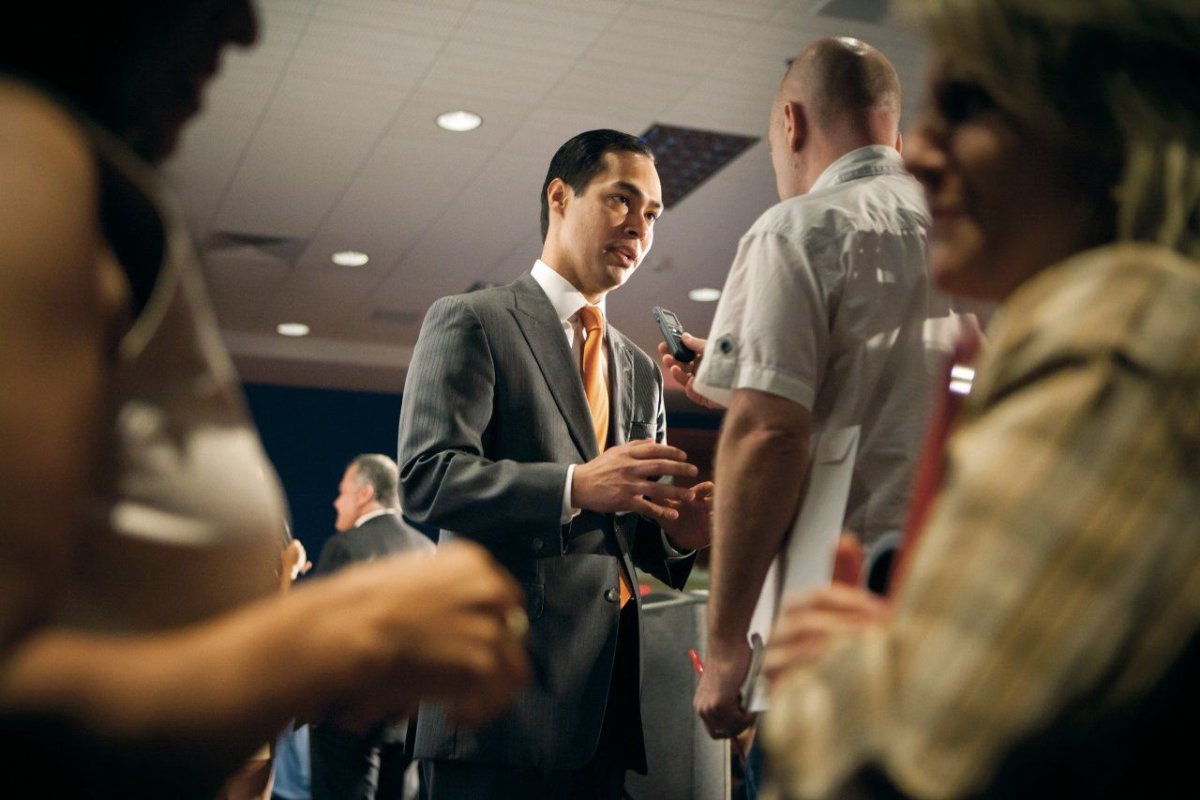
On the drive up to Austin, I asked Castro to imagine that it's 2017 and his mayoralty is over. What do you want to be able to say you've accomplished? He considered the question for a second or two, then started to speak in measured, emotional tones, his right hand curled into the Clintonesque remote-control position, chopping at the air for emphasis. "I want to be able to pick up a list of names of graduates from high schools and colleges in the city, and to see that that list is longer than it was when I started in 2009," Castro said. "If we can get that right, then San Antonio is on an inevitable trajectory toward becoming one of the great cities in the United States, because it has everything else going for it: the demography, the low cost of doing business, the fact that in the near future the continent will be moving along a north-south axis with the growth of Latin America."
Whether Castro can propel himself into the governor's mansion at that point remains to be seen. "He'll certainly have enough of a record to run," says Jim Henson, who directs the Texas Politics project at the University of Texas in Austin. "We've seen people run for statewide office with less. Ted Cruz, for example—he had no experience as an elected official. That said, while being mayor of a big city in Texas is a decent foundation, it's probably not sufficient on its own."
For Castro, the likeliest barrier won't be the length of his résumé, but rather its progressive content. Can a liberal Latino cross over and compete with Texas's broader, conservative-leaning electorate? Castro believes he can. He is convinced, for starters, that the Texas GOP has left the political center up for grabs. "Republicans are so far out to the right, it's pushing people into the Democratic Party," he tells me en route to Austin. "Medicaid expansion is a good example. It's the chamber of commerce, the Democrats, and even some Republicans on one side, and Perry, Cornyn, and Cruz on the other. These people are losing the business community. They're losing the middle. And it's happening right in front of their eyes.
"The advantage that Democrats have is that they're a big-tent party," Castro continues. "There's no litmus test to being a Democrat here. Right now, in Texas, you could be pro-life or pro-choice. You can be pro–education reform or traditionalist on education. Republicans have already given up so much of the field. When you add in resources, demography, and strong candidates, it will catch up with them."
Castro also thinks that generational and demographic shifts are about to make the Lone Star State less anti-government—less "Don't mess with Texas"—than ever before. The day after the Medicaid presser, Castro is scheduled to return to Austin for an event with Joaquín at the Lyndon B. Johnson Presidential Library, followed by a dinner with members of the Johnson family in LBJ's private suite. I ask if the current crop of Texas Democrats can learn any lessons from Johnson. "First, just a reminder that it's possible," Castro says. "For all of those years Texas was Democratic. There was a very significant constituency in Texas that appreciated the kinds of investments that LBJ spearheaded: in education, in housing, in social services. And now it's a new day. When you tell this generation that all government is wasteful and that programs won't make any difference, it doesn't have the same resonance that it had a generation ago."
Meanwhile, the rapid growth of Texas's Hispanic population will only accelerate the shift away from Tea Party conservatism, according to Castro. "It's fair to say that on hot-button topics like immigration, Texas Republicans have held their punches," he says. "They know." The problem, he argues, is that the GOP has ignored the less symbolic issues that affect all Texans but tend to hurt Hispanics the most. "They're pushing some of the worst policies in the nation," Castro insists. "They're underfunding schools that are now 50.3 percent Hispanic. They're attracting low-wage jobs as opposed to high-wage jobs, which creates an invisible ceiling for a lot of folks. They're not funding Medicaid, and they're underfunding social services in general. The Republican Party is generally not doing much for the growing young Hispanic community that exists in Texas, and eventually, that will cost them."
But only if the Hispanic community actually turns out to vote. On a gray, drizzly Wednesday evening, I decide to drive up to Killeen, 70 miles north of Austin, to see Battleground Texas in action. A majority of Killeen residents are black or Latino, yet the city leans Republican, largely because it's home to the conservative military voters of Fort Hood. The gap between Killeen's demographics and its politics makes it a prime target area for Battleground Texas's organizers, but tonight, it's clear the effort is still in its infancy.
Clad in a crisp blue dress shirt, his goatee carefully trimmed, Alex Steele—formerly an Obama operative in Iowa and Colorado, now field director for Battleground Texas—stands in front of 50 locals, most of them senior citizens, in room 101 of the Killeen Community Center and explains how they can turn Texas blue. "To anybody who says we can't do this," he announces, "we say, 'Game on.'" Steele's plan is straight out of the Obama playbook: harness technology and social-networking strategies to exponentially enhance the impact of traditional voter outreach. Rather than getting 250 paid organizers to make 50 contacts each and ultimately reach 12,500 voters, Steele explains, we want 250 field organizers to oversee five teams of volunteer neighborhood leaders who will use their own Facebook, Twitter, and email accounts to reach 500,000 voters.
The attendees nod, fill out forms, circle up for "breakout sessions," and pass around slices of blue and white "Game On" sheet cake. But ultimately, they seem a bit bewildered. Then again, the first volunteers to show up at the Randall, Iowa, community center back in early 2007 probably felt bewildered too.
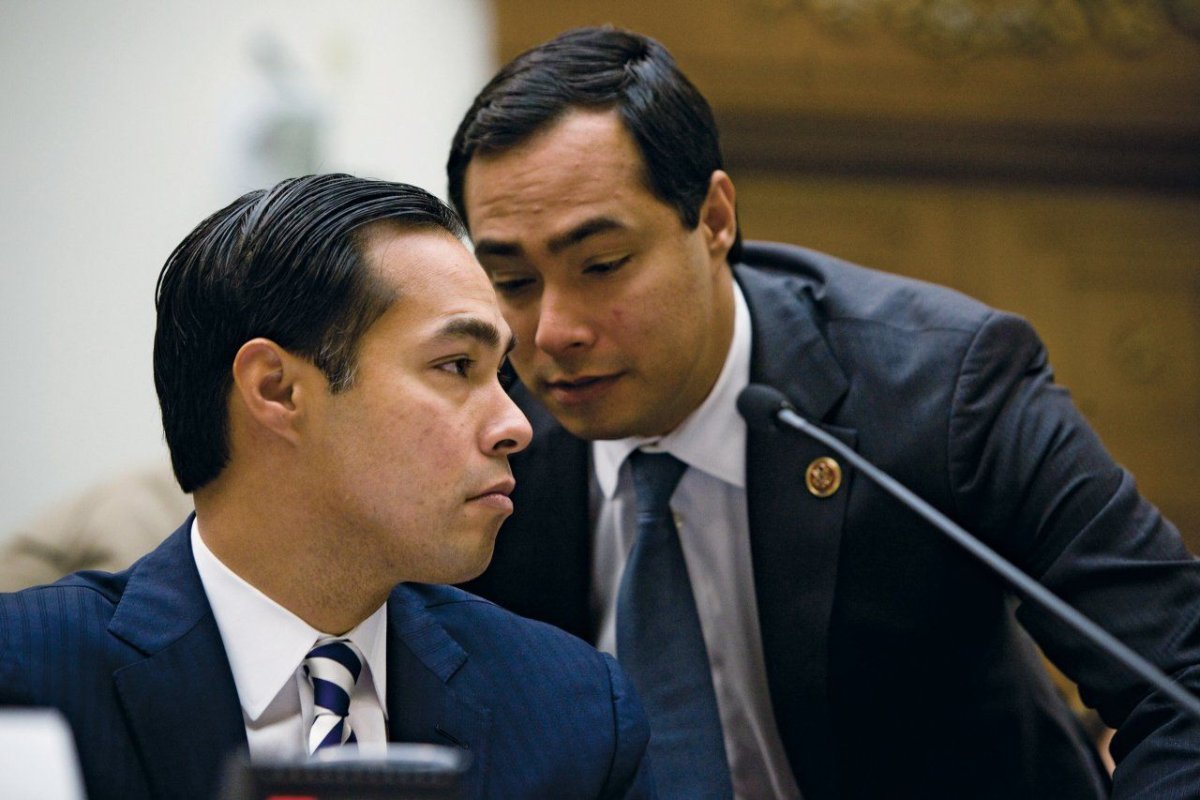
When Castro's name is mentioned, everyone in Austin, whether a supporter or an opponent, says the same thing: it's not a matter of if but when.
Castro himself seems to agree. At one point, I asked what Obama's experience on the national stage had taught him. I was surprised, for some reason, by his reply. I suppose I was expecting a homily about governance. But Castro's answer was all about campaigning. "The importance of timing," he said. "Obama got elected at exactly the right time, when the pendulum had swung so far in one direction, with a conservative president. And it was swinging in the other direction, to a young, fresh-faced, energetic Democratic elected official. Often the biggest changes come about at the right time."
Publicly Castro insists that the "right time" is at least "six to eight years" off—when he believes efforts like Battleground Texas will start to bear fruit, and when (not coincidentally) term limits will mean that his time in San Antonio is up. But even so, some people are convinced the mayor is privately considering an earlier bid for statewide office. One of them is Manuel Medina, the chairman of the Bexar County Democratic Party, who last year launched his own "draft Castro" campaign. "I think he's focused on his reelection right now," says Medina (who adds that he has no inside information). "But we need a candidate, and I believe Mayor Castro is going to step up in 2014."
As we weave through Austin in the black SUV, Castro's comment about "candidates who excite people" is still hanging in the air. I decide to pose the obvious follow-up.
Like whom? I ask.
Castro pauses for a moment. When he starts to speak again, his voice is noticeably softer, his pace slower. "I believe that if Henry Cisneros had run for governor in 1990," he says, "that would have changed the landscape of politics in Texas."
Henry Cisneros, it's worth noting, was a city councilman in San Antonio at 27. Mayor at 33. Secretary of Housing and Urban Development at 45. Widely touted as a leading candidate for governor, or senator, or maybe even president, until an infidelity scandal derailed him in the 1990s. A prodigiously talented, pioneering Hispanic politician. In other words: Julián Castro before Julián Castro was Julián Castro.
The current mayor of San Antonio cracks a knuckle and glances out the window, then continues. "That would have been the first time a mainline, very popular Hispanic Democrat would have run for one of the top three statewide seats," Castro says. "If Henry had run, I think that would have galvanized Hispanics in Texas. It would have created a voting habit in the community."
Just then, I glimpse a massive domed building on the right side of the road.
"The state capitol," says Castro's communications director.
Castro cuts in. "And that's the governor's mansion," he says, pointing to a white Greek Revival residence across the street. His phone is buzzing; he picks it up.
"We're almost there," he says.
Andrew Romano is a senior writer for Newsweek and The Daily Beast.
Uncommon Knowledge
Newsweek is committed to challenging conventional wisdom and finding connections in the search for common ground.
Newsweek is committed to challenging conventional wisdom and finding connections in the search for common ground.
About the writer
To read how Newsweek uses AI as a newsroom tool, Click here.








